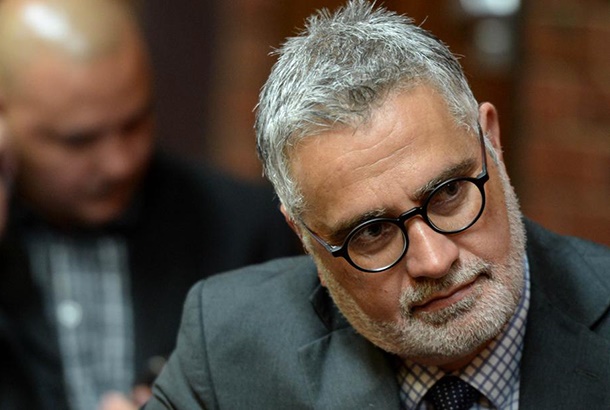
On the morning of August 25, 2014, the then head of SARS's high-risk investigations unit (HRIU) and a senior executive of SARS, Johann van Loggerenberg, walked into the offices of the inspector-general of intelligence – or the IGI – housed in a nondescript building at 1 Lois Avenue in Menlyn, Pretoria. He was acompanied by two counsel and an attorney who acted on instruction of SARS and proceeded to explain in minute detail how the assault on the taxman was unfolding.
In the meeting which lasted a better part of the day, sitting across Advocate Faith Radebe (the IGI), Advocate Jay Govender, two assistants and a sound technician, Van Loggerenberg laid out 38 instances and incidents which SARS believed amounted to the illegal undermining of the tax collector's mandate.
He also implicated 64 people as being involved in highly irregular, illegal and improper activities designed to cripple and discredit SARS through a sophisticated system of disinformation, subterfuge and sabotage.
SARS had by then been on the receiving end of a series of attacks in the public domain, and it reached a crescendo some weeks before Van Loggerenberg met with Radebe when the country's two leading Sunday newspapers, City Press and Sunday Times, published two front-page stories with vastly different angles.
READ: Secret intelligence report into SARS a 'travesty' and 'false', says former taxman
City Press revealed the existence of a coordinated attack on SARS launched by the State Security Agency's Special Operations Unit and explained how agents and spies plundered slush funds for their own benefit. The Sunday Times however led with the infamous "Love affair rocks SARS" and detailed the end of the relationship between Van Loggerenberg and one Belinda Walter, a lobbyist for the tobacco industry who later turned out to be a spy for the SSA.
Days after the reports and triggered by City Press, David Mahlobo, then state security minister and a close ally of Jacob Zuma, mandated Radebe to launch an investigation. The terms of reference were pretty clear: it was to look at the City Press reportage and allegations of SSA/SOU irregularities, whether or not there was a campaign against SARS and other institutions, the role of the SSA in the tobacco industry and whether the SOU had involved themselves in other nefarious activities.
If they did their job, SARS would be safe
Van Loggerenberg, who by then had been in charge of the HRIU for more than five years, believed that the IGI investigation would finally lay bare the extent to which the organised campaign against one of the country's most important institutions was conceived and managed by the country's spy agency.
SARS had good reason to feel threatened – it had notched up a series of successes in clamping down on the country's biggest tax evaders and started making inroads into the illicit economy. The HRIU had by then recovered billions in lost tax, customs and excise. But it made powerful enemies, too, with SARS and the HRIU also encroaching on the expansive patronage network around Zuma and his acolytes.
When Van Loggerenberg left the IGI's offices that afternoon he genuinely believed that, at long last, the smear campaign against SARS might be exposed. The IGI, after all, is constitutionally and legally mandated to provide oversight of the intelligence services. Crime intelligence, military intelligence and state security all fell under the ambit of the IGI and Parliament's Joint Standing Committee on Intelligence. If they did their job, SARS would be safe.
Shortly after reporting back to Ivan Pillay, SARS' acting commissioner, he was given a verbal message from Radebe by the SARS company secretary: "Cool it. Don't tell us what to investigate. Don't tell us how to do things. Apologise."
He was flabbergasted. The IGI was supposed to investigate, not intimidate one of their key witnesses. And then he knew – nothing was going to come of the investigation.
Interrogated about SARS operations
At the next meeting with Radebe, Govender and other representatives from the IGI's offices, on September 15, 2014, the whole tone and atmosphere had changed. After having apologised – for the sake of relationships – for his enthusiasm at the first meeting, he was interrogated only about SARS operations.
It was odd, because the mandate of the investigation was to look at the allegations around the SSA and the SOU, organisations and their activities which of course became the unchallenged subject of Jacques Pauw's blockbuster book, The President's Keepers, which set out in chapter and verse exactly how the SSA went rogue. It also, much later, and after the decimation of SARS's investigative capacity, led to an investigation into the SSA and recommendations to President Cyril Ramaphosa to make sweeping changes to the country's intelligence architecture.
But on that day in September 2014, when Van Loggerenberg trudged out of the IGI's offices in Menlyn after a much shorter engagement than the first one, he knew that even though SARS provided the IGI with facts, evidence and witnesses that related directly to what later became known as "state capture", nothing was going to come of it.
He felt the IGI was going to aid and abet the project which wanted to decapitate the SARS leadership and destroy its ability to curb the illicit economy.
In the same month that Van Loggerenberg came to realise that the IGI investigation was not going to be kind to SARS, Tom Moyane walked into the SARS headquarters in Brooklyn, Pretoria, to start his reign of terror. A couple of weeks after Moyane's arrival the front page of the Sunday Times screamed that "SARS bugged Zuma".
And on October 31, 2014, Radebe handed Mahlobo – who by then had established himself as one of Zuma's strongmen – the IGI's report.
It's that report that Julius Malema published on the EFF's website this week. And it's exactly the same narrative contained in a plethora of reports since, including those by Advocate Muzi Sikhakane and Public Protector Busisiwe Mkhwebane: "There was a rogue unit at SARS. It was run by Van Loggerenberg, with the assistance and knowledge of Pillay and Pravin Gordhan. It's illegal, it must be investigated."
IGI report scathing
The IGI report consists of 49 pages and three annexures: one a copy of a discredited memorandum titled "Project Snowman" as well as two internal SARS documents.
It is scathing of Gordhan, Pillay and Van Loggerenberg, and not only does it make findings about the legality of the SARS investigations unit, it also accuses SARS of obstructing the fight against crime, aiding tax evaders and of conspiring with tobacco kingpins to get them off the hook. SARS, according to the report, was "hostile" and "arrogant", "overbearing" and "officious". It was an organisation whose internal systems could not be trusted and that needs to be brought back into line.
The SSA, however, the organisation that was supposed to have been the focus of the IGI's investigation, comes out smelling of roses. Radebe – with the assistance of Govender – found its conduct to be exemplary, that it carried itself with professionalism and grace and that it is the biggest positive to come out of the probe.
The report relies chiefly on interviews conducted with Walter, SSA operative Chris Burger and former SARS official Mandisa Mokwena, who also spied for the SSA, as well as the "Project Snowman" report.
All three were named by Van Loggerenberg in his very first interview with SARS as persons involved in the organised and coordinated effort to undermine SARS. He told the IGI, and provided documentary evidence, that Walter was implicated in, among other things, the obstruction of justice, racketeering and fraud. Burger, Van Loggerenberg explained, was suspected of much the same misdeeds, while Mokwena continued with her covert activities after leaving SARS under a cloud.
And then there's "Project Snowman", a discredited memorandum of unknown origin which sets out how SARS and its HRIU operated illegally. The memo was typical of disinformation campaigns of the time, reminiscent of the "Browse Mole Report" and the later "Ground Coverage Report", both of which sought to give Zuma cover to act against his enemies, real or perceived. Radebe, however, used Snowman as a base document.
Van Loggerenberg hitting back
Now Van Loggerenberg is hitting back. In an affidavit filed by Pillay at the High Court in Pretoria, Van Loggerenberg details the tragicomic events of 2014, when the IGI refused to consider his submissions in their investigation, demands the reopening of the investigation into 64 persons involved in the covert attack on SARS and the recusal of Govender, who allegedly knew about the hard evidence Van Loggerenberg provided to the IGI.
The IGI, in an exchange of letters with Van Loggerenberg's attorneys, also revealed that they have lost all evidence Van Loggerenberg provided and cannot find the transcripts or recordings of its meeting with him. It will therefore have to be reconstructed from scratch.
The 49-page IGI report, completed in ten weeks, was the basis on which subsequent damning findings critical of Gordhan, Pillay, Van Loggernberg and the SARS investigations unit was constructed. Poorly written and riddled with grammatical and other language errors (there are many sentences without a verb, for example), it relies on hearsay, interviews with people of questionable character and a memorandum that has been debunked time and again.
Van Loggerenberg's affidavit in the High Court, by contrast, runs to more than 300 pages and consists of pages and pages of internal SARS documents, legal papers, ministerial memoranda and other supporting papers.
The term "rogue unit" only became vogue after the report was handed to Mahlobo. But its genesis lies in the investigation done by Radebe, herself a former spy.
Gordhan's review of Mkhwebane's report will be heard in the High Court soon. Only then will the whole sorry saga be put to rest.




 Publications
Publications
 Partners
Partners























